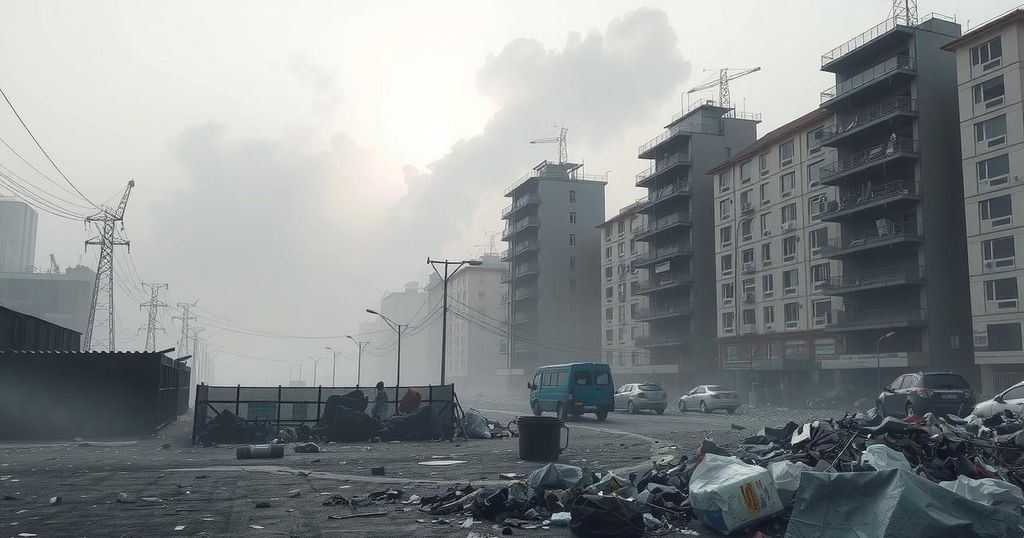Ghana, Nigeria, Chad, and Rwanda Among the World’s Most Polluted Countries

The 2024 World Air Quality Report reveals that Ghana, Nigeria, Chad, and Rwanda rank among the most polluted countries. Chad has the highest PM2.5 concentration at 91.8 µg/m³. Ghana’s pollution levels have dramatically increased, now sitting at 35.8 µg/m³. Air pollution is a critical public health emergency in Ghana, causing approximately 28,000 deaths annually. Experts urge for immediate action to reduce pollution and improve air quality monitoring across Africa.
The 2024 World Air Quality Report indicates alarming pollution levels throughout Africa, with Ghana, Nigeria, Chad, and Rwanda among the most polluted countries globally. This air quality crisis poses a significant threat to public health, affecting millions of lives across the continent. Chad leads the global rankings with a concerning PM2.5 concentration of 91.8 µg/m³, greatly exceeding the World Health Organization’s recommended limit of 5 µg/m³. Meanwhile, Ghana ranks 14th with 35.8 µg/m³, reflecting a stark increase in pollution over the years.
The tiny PM2.5 particles possess serious health risks as they penetrate deep into the lungs and bloodstream, contributing to respiratory and cardiovascular diseases. Notably, air pollution has shortened life expectancy by an average of 2.7 years in heavily polluted areas. In Ghana, approximately 28,000 fatalities occur each year due to air pollution, equating to one death every 19 minutes. The global death toll linked to air pollution reached 8.1 million in 2021.
Ghana experiences air pollution levels seven times higher than WHO’s safety threshold, with the capital, Accra, being the 16th most polluted city worldwide at 36.3 µg/m³. In an alarming development, Kumasi has now surpassed Accra, registering a peak PM2.5 level of 39.5 µg/m³. Pollution in Ghana has escalated dramatically over the years, as indicated by its 2024 record of 35.8 µg/m³, moving up from the 27th position in 2022 to the 14th globally.
Africa continues to grapple with severe air pollution, as evidenced by the 2024 report findings. Among the world’s ten most polluted nations, five are in Africa. Additionally, only 24 out of 54 African countries submitted air quality data, calling attention to inadequate monitoring infrastructure that hinders effective responses to pollution. Diagnosing the magnitude of air quality issues remains challenging, as significant cities like Lagos lack sufficient data.
The public health implications of air pollution in Ghana are dire. With air quality deterioration contributing to nearly 2,333 monthly fatalities, the crisis has become a public health emergency. The economic consequences are staggering as well, potentially costing the nation $137.8 billion by 2040 if unaddressed. The continuous rise in PM2.5 levels—from 30.2 µg/m³ in 2022 to the current 35.8 µg/m³—disrupts daily life for millions.
In stark contrast to much of Africa, some regions maintain healthier air quality. Only seven countries globally met the WHO’s PM2.5 guideline in 2024, with Nieuwoudtville in South Africa being the sole African location to satisfy these standards. Factors exacerbating air pollution in Africa include rapid urbanization, industrial emissions, and informal waste burning practices.
To combat this crisis, experts advocate for stricter vehicle emissions regulations, increased investments in renewable energy, enhanced air quality monitoring, and stringent anti-burning policies. Ghana’s alarming ranking among the most polluted nations underlines the urgent need for action. Without comprehensive measures, air pollution may escalate into an even more severe public health threat in the coming years.
The 2024 World Air Quality Report underscores the urgent need for effective air quality management in Africa, with Ghana among the most polluted countries. The report reveals alarming PM2.5 levels that result in significant public health crises and economic consequences. Urgent measures are necessary to curb pollution, enhance monitoring, and implement stricter regulations to safeguard citizens’ health and well-being. Failure to act could exacerbate this crisis, leading to an even greater toll on public health and the economy.
Original Source: www.myjoyonline.com







